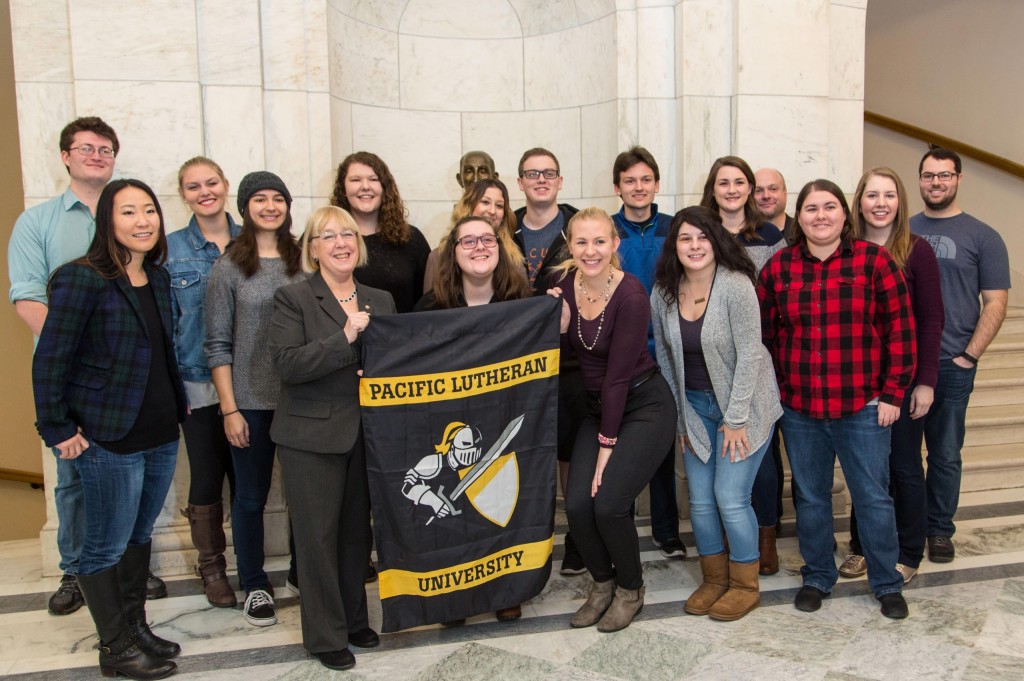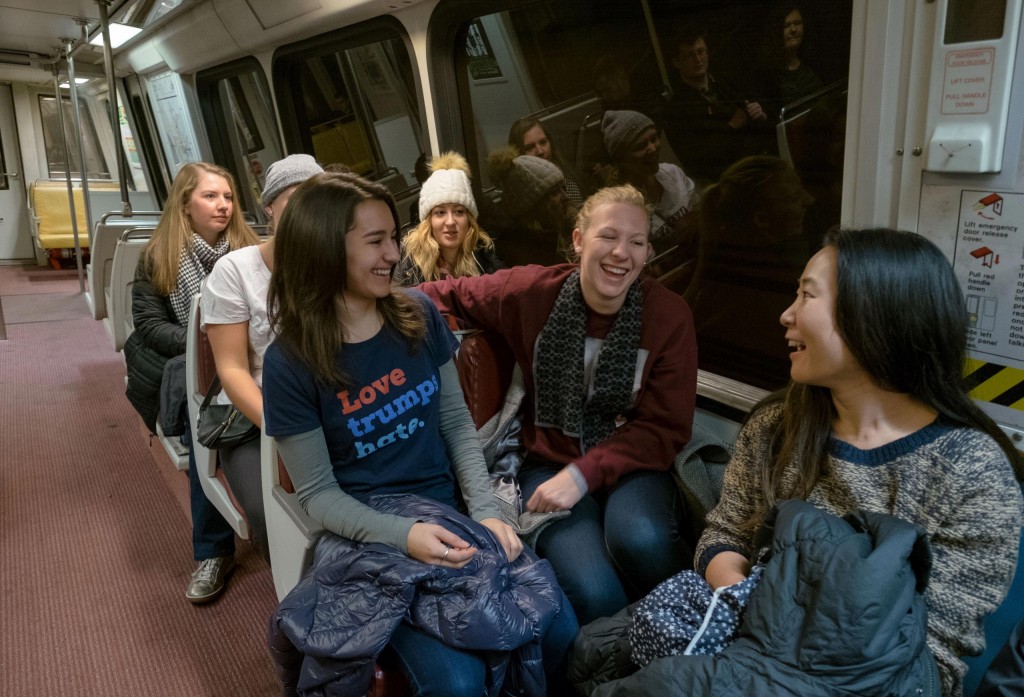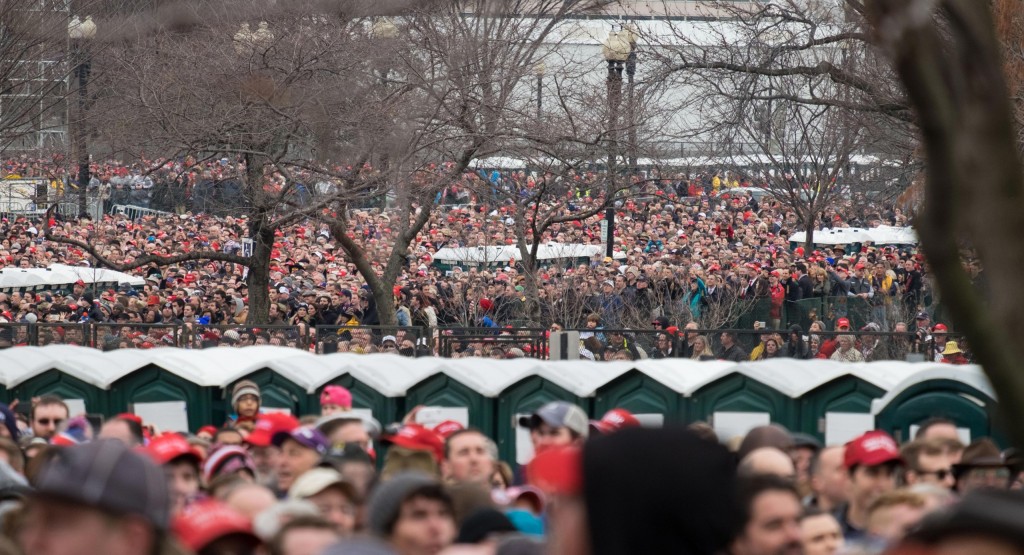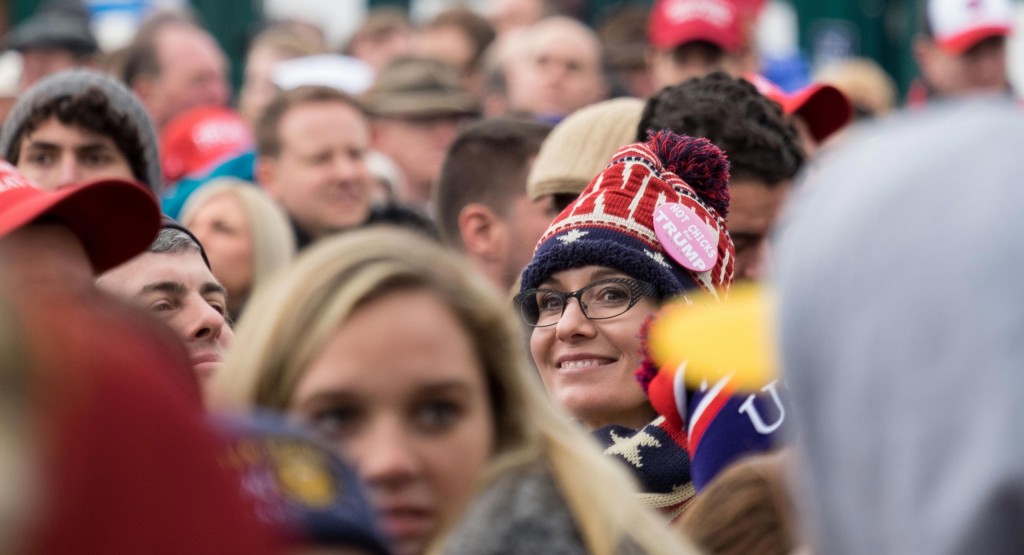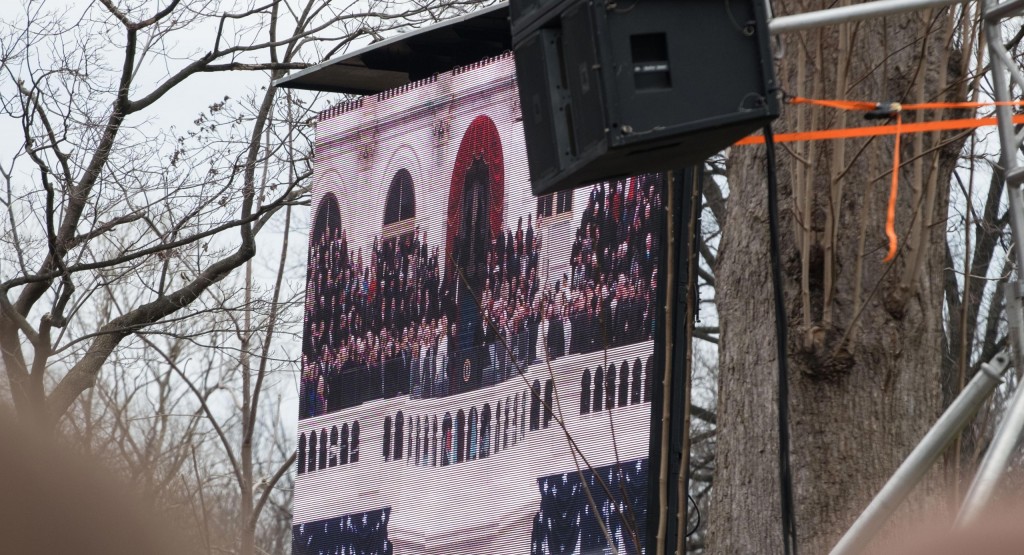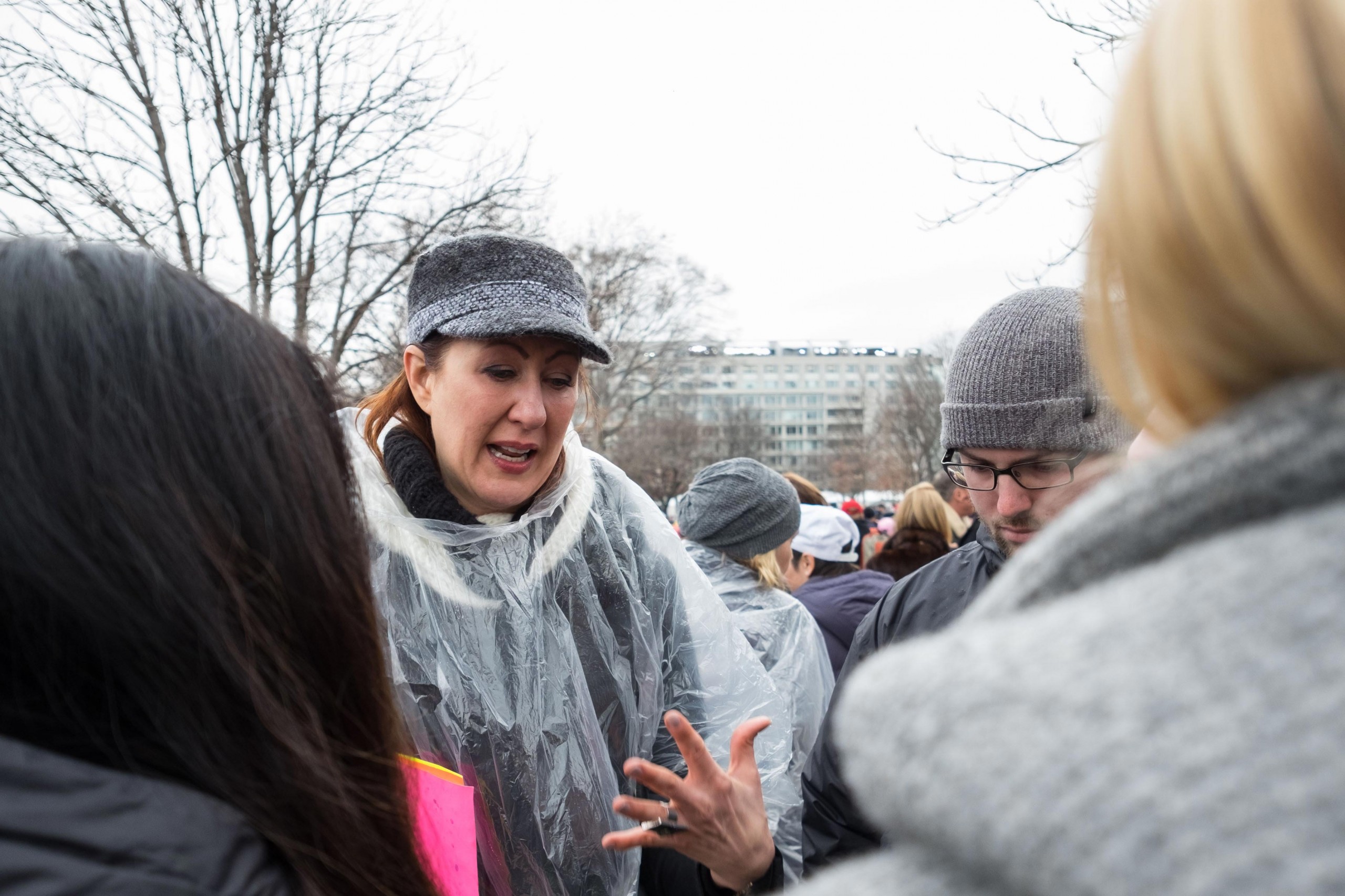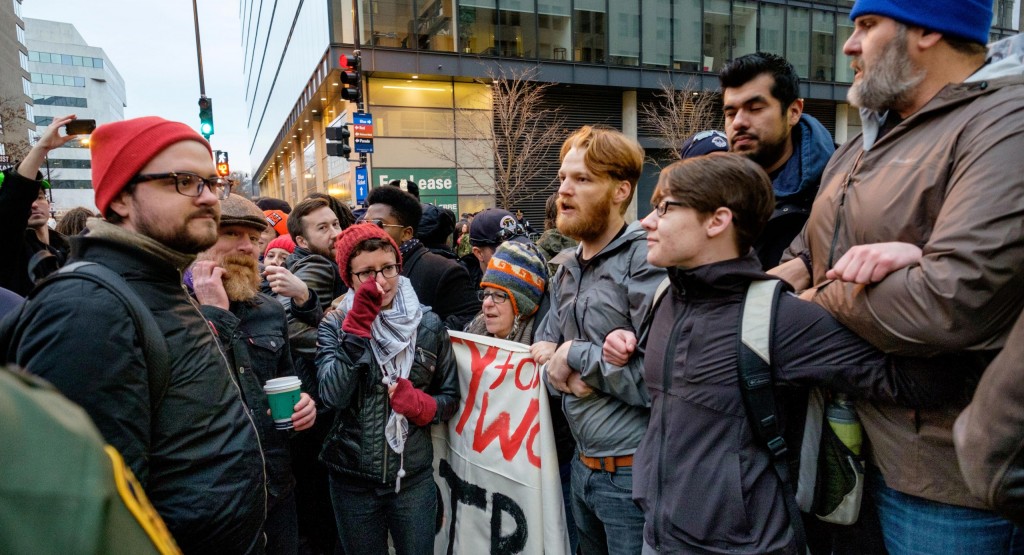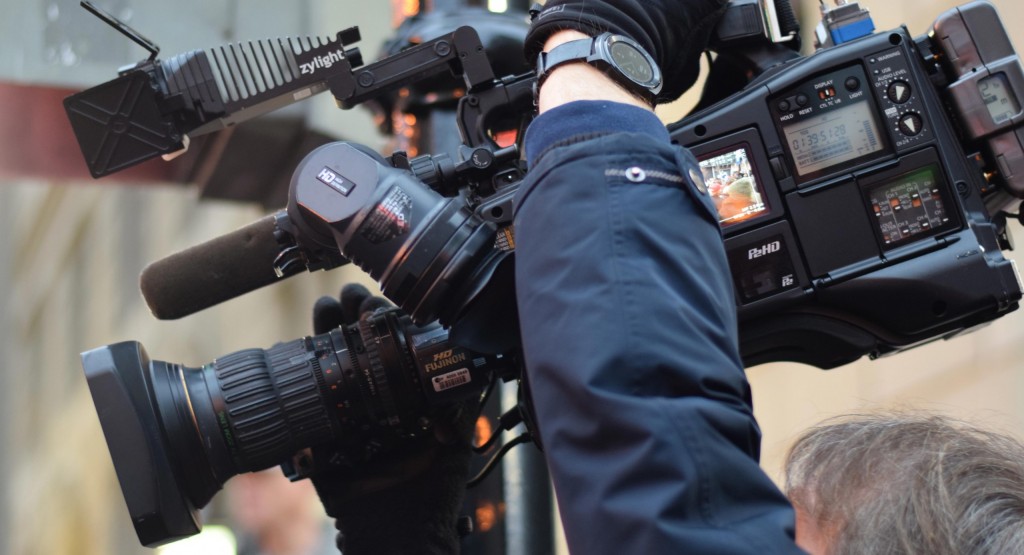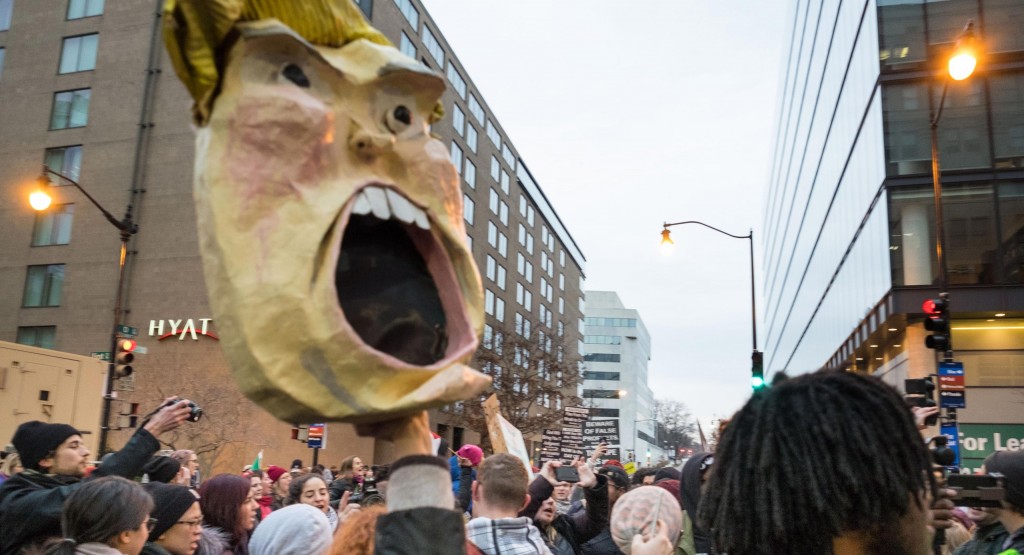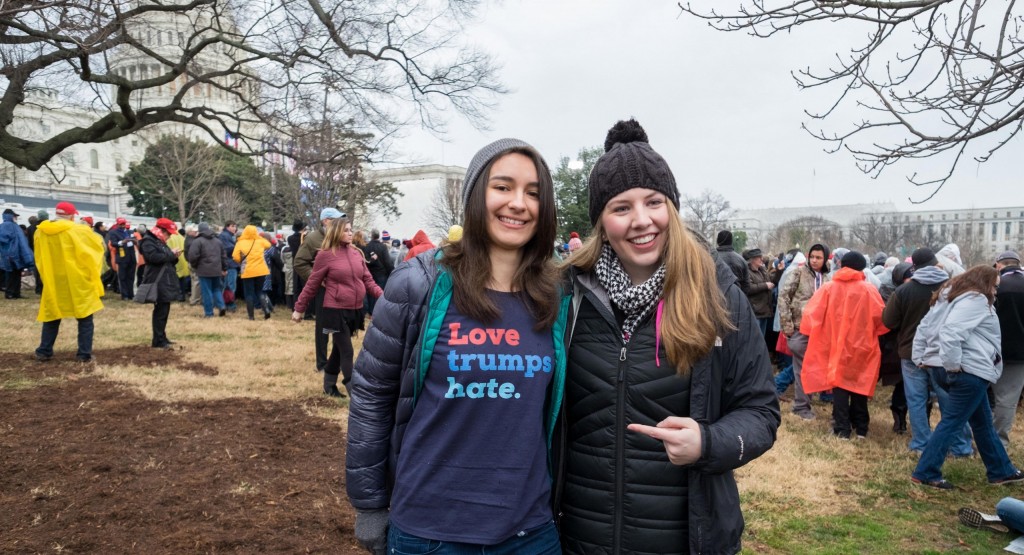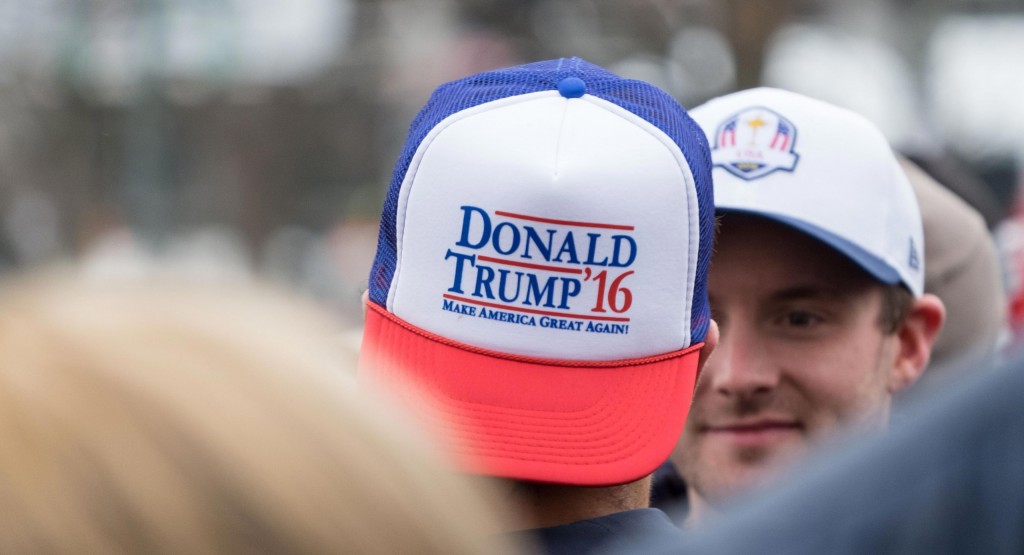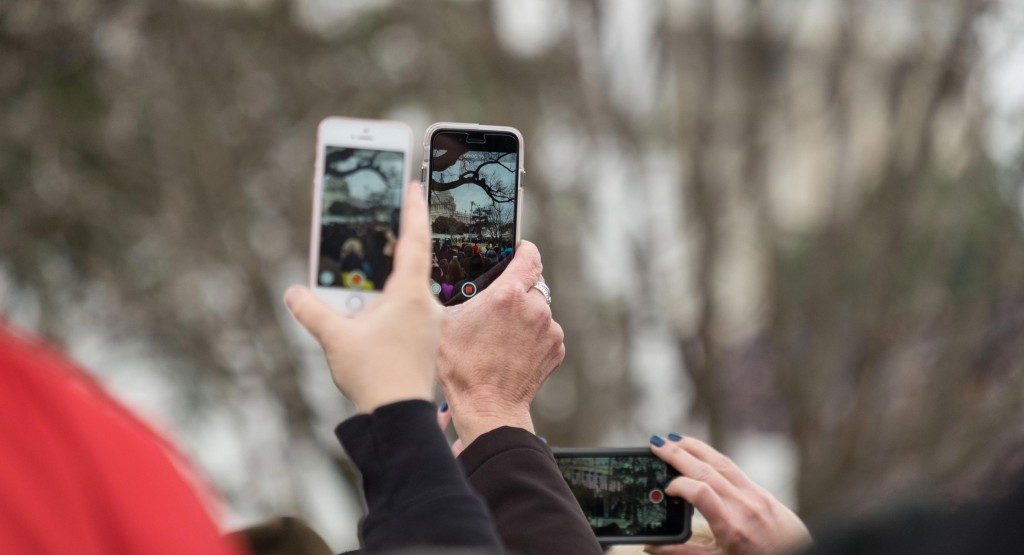Pageantry and Protests: PLU students experience ‘messiness of democracy’ at President Trump’s inauguration
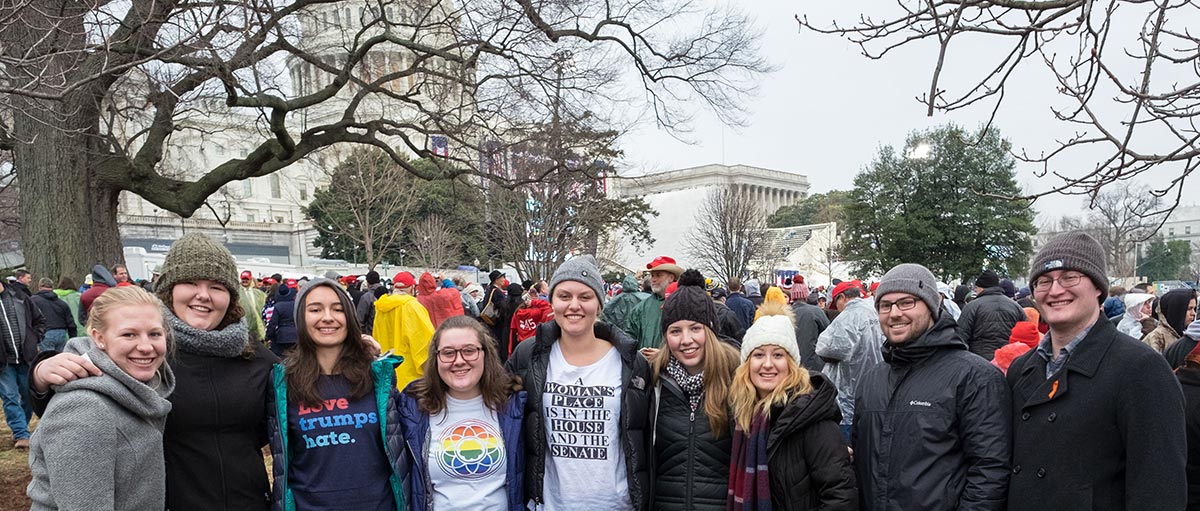
Image: PLU students at the inauguration of President Donald Trump. (All photos by John Froschauer/PLU)
By Zach Powers '10
PLU Marketing & Communications
Washington D.C. (March. 9, 2017)- The small group of Pacific Lutheran University students, standing huddled together in a jam-packed section toward the front of the National Mall, remained silent. Some shook their heads in disbelief. Others wore expressions of shock. Two couldn’t stop tears from streaming down their rain-soaked cheeks.
“We Americans have always been a forward-looking, problem-solving, optimistic, patriotic and decent people,” said Sen. Chuck Schumer (D-N.Y.), delivering remarks at the inauguration of President Donald Trump. The crowd of more than a quarter million people listened quietly.
“Whatever our race, religion, sexual orientation, gender identity, whether we are immigrant or native-born, whether we live with disabilities or do not, in wealth or in poverty, we are all exceptional in our commonly held, yet fierce devotion to our country, and in our willingness to sacrifice our time, energy and even our lives to making it a more perfect union.”
When Schumer said the words “race” the crowd began to boo. By the time he’d uttered the words “gender identity,” the boos became deafening, joined by jeers and furious shouts of disapproval.
The senator hadn’t mentioned marriage equality, or even equal rights. He only posited that all Americans are devoted to their country, an assertion that the vast majority in attendance seemed to find contemptible. And though the group of Lutes, a recently out queer woman among them, initially planned to spend the morning as “neutral observers,” this was the moment their final embers of neutrality faded away.
Registration for PLU’s Washington, D.C., J-Term course was at capacity by the end of October, highlighted by tickets to the inauguration and featuring behind-the-scenes access and tours of iconic institutions such as the United States Congress and The Washington Post. The result of the November election, however, threatened the course’s agenda.
“A lot of students were asking if they could go on the trip, but skip inauguration,” recalled Kaitlyn Sill, associate professor of politics and government. “And while the answer was yes, we really wanted to encourage them to keep an open mind.”
Sill co-taught the course, titled “Democracy in Theory and in Practice,” with Michael Schleeter, assistant professor of philosophy. Both PLU faculty members received numerous emails from students concerning attendance of inauguration, prompting a discussion among faculty and registered students a week later to discuss Inauguration Day expectations.
“We’re going to be walking into an epicenter,” Sill told the students, gathered in a Xavier Hall classroom a week after the election. “This is where everyone is coming that cares the most. We’re going to get people with a lot of emotion and people who are extremely invested in this.”
Sill and Schleeter urged the students to consider how social scientists would engage such an event, by recognizing the significance and trying to remain impartial. “We want to think of this as a very unique and amazing opportunity in which we are living and experiencing history as it’s unfolding in real time,” Sill said.
In the weeks leading up to J-Term, all 14 students agreed to community guidelines, including two specific to Inauguration Day. For one, they vowed to stick together, making the decision to navigate the event in one or two groups. Second, as their instructors suggested, they planned to be “neutral observers.”
The morning of the inauguration, Sill, Schletter and eight students boarded a Metro train at Bethesda Station and headed downtown. Six other students in the class left more than an hour earlier.
On the train, Brooke Wolfe ’17 and Josie Courtney ’19 shared similar expectations. “It will be interesting,” each of them said.
The first four stops were quiet. For a brief time, the students and faculty members were the only people on the subway car. But, as it neared the city center, enthusiastic Donald Trump supporters filled the car.
As the group walked from Metro Station to the inauguration grounds, they passed hundreds of protesters who angrily jockeyed with police while chanting “no Trump, no KKK, no racist USA!”
“The worst part of the day was walking by all of the protestors on our way into the actual event,” Courtney said. “Hearing what they were saying was hard because I was thinking ‘yes I agree with you, but I have to stay with my group.’”
Once clear of the airport-style security checkpoint, the group made its way into the sea of tens of thousands of inauguration attendees, the vast majority clad in Trump’s signature, bright red “Make America Great Again” baseball caps.
The group slowly maneuvered through the dense crowd into a central area with a clear view of the stage. It soon became clear, however, that a move was needed to keep the students safe.
“There was a man standing next to Dr. Schleeter who saw my shirt and said to another guy he was with: ‘that girl is here to protest and she’d better get out of here before she gets hurt,’” said Tori Sullivan ’18, who was wearing a T-shirt that read in large, block letters “Love trumps hate.”
“My philosophy on being there was all about subtlety,” said Sullivan, a politics and government major and member of the PLU debate team. “I was there to watch the inauguration. I was wearing my shirt, which wasn’t a huge statement, but it meant something to me.
“Having someone say something like that about you makes you question what you’re doing and why you’re there. It definitely started to make me think about making a choice: if I should leave, stand quietly or respectfully express my dissent.”
Sullivan continued to contemplate that question, as she and her classmates nudged and weaved their way through the crowd in search of a safer vantage point.
Almost two hours later, festivities began on stage. Political dignitaries emerged from the halls of the U.S. Capitol Building and claimed their seats in the temporary bleachers assembled behind the podium. Cinema-size screens scattered around the mall cycled through live close-ups of current and former elected officials, many accompanied by their spouses.
Each Republican who was shown on screen was met with a smattering of temperate applause by the vast majority of those in attendance. Whenever a Democrat appeared on screen, the crowd booed and jeered. When the camera cut to Hillary Clinton, most of the attendees erupted in boos and thousands chanted “lock her up, lock her up.” When Michelle Obama was shown smiling backstage, a woman standing just behind the students screamed “they’ll finally be some class in the White House.” Dozens within earshot affirmed her declaration with uproarious laughter.
The PLU students, now standing in a new location, were dumbfounded. All eight of them had supported Clinton, and they knew going in that they’d be among tens of thousands of people celebrating an historic event that they oppose. And though they visualized what it would be like to be a neutral observer at President Trump’s inauguration, they never imagined that their safety would be in question, or what and who they believed in would be disparaged.
Outgoing Vice President Joe Biden was the next Democrat shown on the big screen. Most in attendance began to boo. Sullivan, however, began to cheer. A second later, her classmates joined in. Hundreds of eyes veered from the closest big screen onto the PLU students. Sullivan and her friends smiled broadly, some holding hands, and continued to cheer.
“Typically I don’t like to be the center of attention,” Sullivan said. “But I decided that as long as I was going to be there, I was going to contribute to the democratic process and express an alternative perspective.”
President Donald Trump finished his speech by inviting the crowd to join him in his campaign slogan. As tens of thousands shouted in unison “make America great again,” a man ran up to two women standing 10 feet in front of the PLU students and punched one of them in the head. Both women were holding anti-Trump signs and shouted “not my president” in the waning moments of the president’s speech.
As soon as the punch was thrown, Sill, who volunteers as an advocate for victims of domestic violence, reflexively said aloud, seemingly to herself as much as the group, “I’m going.”
Sullivan’s reflex was the same. “For a second I couldn’t believe it had just happened,” she said. “But immediately after that, without even thinking about it, I just went to her because I didn’t know what was going to happen next.”
Without communicating with one another, Sill and Sullivan both rushed simultaneously to aid the two women, five other students behind them. Together, Sill and her students surrounded the two women, causing their assailant to turn away and flee into the crowd.
As the morning unfolded, Schleeter and Sill realized the plan for students to neutrally observe didn’t take into account the extreme circumstances that would mar the experience. Both faculty members embraced their students’ decision to adjust their plans on the fly.
“We did not anticipate that they would be met with hostility from some of the president-elect’s more enthusiastic supporters, or that violence would erupt during the event,” Schleeter said. “When those things happened, our students responded in the best ways open to them, not as objective and neutral witnesses to history, but as sensitive and conscientious participants in it.”
Sill agreed, noting that the day, in many ways, was even more educational than she expected. “Our students wound up learning an even more important lesson about citizenship in a democracy,” she said. “Knowing the value of being the voice of opposition when it is uncomfortable and how to do so safely and respectfully.”
Meanwhile, the other six students in the class were navigating the crowds outside the event. They arrived at the National Mall much earlier than the larger group, and decided that they were more interested in the protests going on outside the aluminum barricades.
“I always see stuff like that on television and it seems surreal, because it’s only on TV,” Treyce Fleming ’18 said. “I really wanted to get close to it.
“A bunch of stuff was on fire, being destroyed. Tear gas or pepper spray was in the air, we could taste it and feel it on our eyes.”
Eldon Sorensen ’19 was struck by the discipline and professionalism exercised by law enforcement officers to manage and contain the protests. “The stuff that the riot police had to endure was really intense,” Sorensen said. “There were people throwing rocks and bricks, people shouting all sorts of things, cars getting smashed. It gave me a deeper appreciation for the people who put their lives in danger to do that work.”
The wide variety of political ideologies represented by the protestors also surprised Sorensen. “Every crowd (of demonstrators) that we walked past was something completely different,” he said. “It was more than just Trump supporters and anti-Trump supporters; there were extremists from both sides, anarchists and basically everyone else on the spectrum.”
Amid the contentious fusion of adrenaline, emotion and deeply held convictions, the students who explored the protest zones quickly realized they were witnessing the “messiness of democracy” their professors had been describing.
“This class is taught in theory and we certainly saw that in practice,” Sorensen said. “We saw peaceful protests and we also saw people lighting things on fire. It made me think about the debates that have been ongoing for centuries over what constitutes protest that people have a right to, and what constitutes protest that is a danger to the public.”
A few hours after the inauguration, the groups reunited at a pizzeria to discuss the momentous day. As they compared notes, they came to many of the same conclusions.
“I can definitely see and understand the division in this country a lot more after today,” Courtney said. Olivia Cook ’18 nodded in agreement. “I don’t think I’ve ever felt that much animosity in the same small area.”
Many of the students described conversations they’d shared with inauguration attendees or protestors with whom their political convictions differed. “I talked to as many Trump supporters as I could,” Amanda Curran ’17 said. “I tried to not share my opinions and just listen to what they had to say. For the most part, they were really nice.”
For two students in particular, Lottie Duren ’19 and Josephine Rodriguez ’17, the experience resonated on a personal level.
“I went in thinking I’d be super neutral and that I’d just watch things, but that all changed when I felt terrified for my identity,” said Duren, who recently came out as queer to her friends and family. “When Schumer mentioned the existence of gay people and basically everyone there starting booing, it made me feel like ‘OK I’m right here and this is terrifying that you don’t like that I exist.’”
Rodriguez shared a similar experience. “Being a Hispanic woman at inauguration was tough because people were saying all sorts of horrible stuff about immigrants and Mexicans, which was pretty heart wrenching,” she said. “It was weird looking around and realizing ‘oh my gosh all of these people are white.’ I couldn’t help but wonder if there was a place in this sort of group for people like me.”
All of the students agreed they were glad to experience inauguration and the protests.
“I wouldn’t have wanted to experience that on my own,” Courtney said. “I’m also glad you two were there with us (motioning toward Sill and Schleeter) because it helped me stay calm and level-headed.”
Many students could already describe how their experience in D.C. would impact their lives, even with a week and a half left in the course.
“This trip has really motivated me to get more involved and learn more about the issues, because I want our country to do well and I want people to be equally represented,” Fleming said.
Sullivan, still wearing the same T-shirt, quietly took it a step further: “It really just made me think about how far we have to go.”



